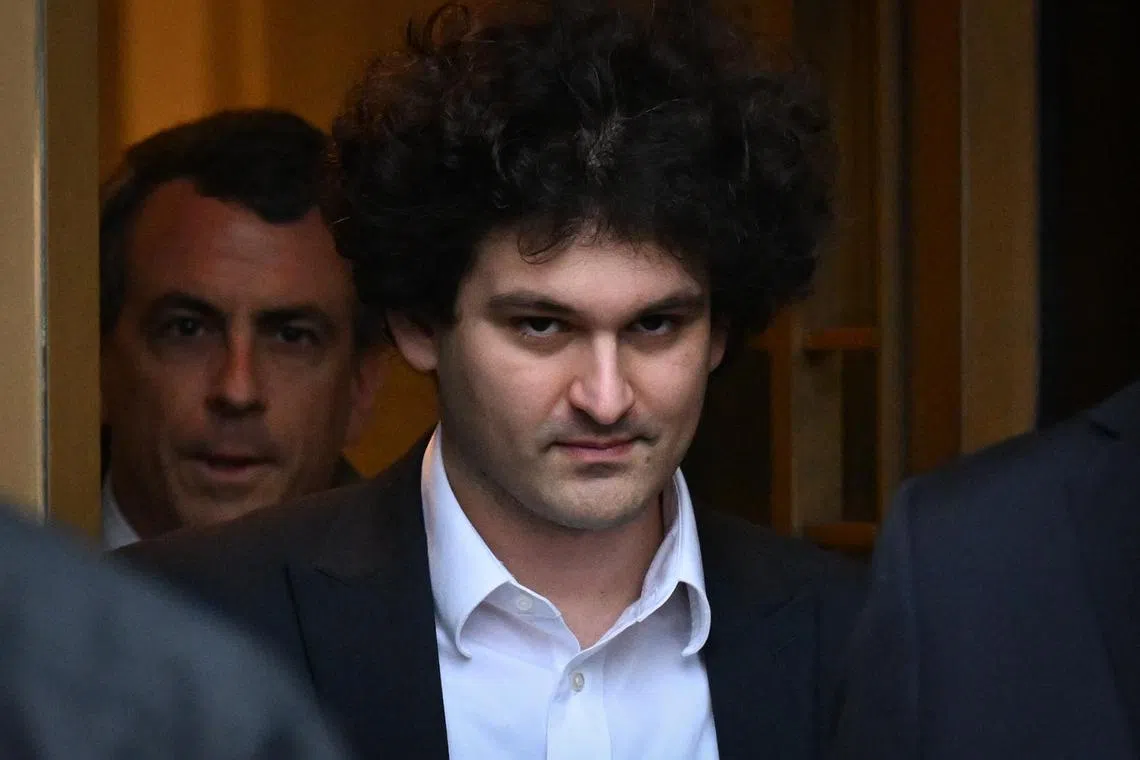Failed crypto exchange FTX has found over $6.6 billion in cash or saleable crypto
Sign up now: Get ST's newsletters delivered to your inbox

FTX founder Sam Bankman-Fried has been indicted on two counts of wire fraud and six conspiracy counts.
PHOTO: AFP
NEW YORK/WILMINGTON, Delaware – Crypto exchange FTX has recovered more than US$5 billion (S$6.6 billion) in liquid assets but the extent of customer losses in the collapse of the company founded by Sam Bankman-Fried is still unknown, an attorney for the company told a US bankruptcy court on Wednesday.
The company, which was valued a year ago at US$32 billion, filed for bankruptcy protection in November, and US prosecutors accused Bankman-Fried of orchestrating an “epic” fraud
“We have located over US$5 billion of cash, liquid cryptocurrency and liquid investment securities,” Mr Andy Dietderich, an attorney for FTX, told US bankruptcy judge John Dorsey in Delaware at the start of Wednesday’s hearing.
Mr Dietderich also said the company plans to sell non-strategic investments that had a book value of US$4.6 billion.
But he said the legal team is still working to create accurate internal records, and the actual customer shortfall remains unknown. The United States Commodities Futures Trading Commission has estimated missing customer funds at more than US$8 billion.
Mr Dietderich said the US$5 billion recovered does not include assets seized by the Securities Commission of the Bahamas, where the company was headquartered and Bankman-Fried resided.
FTX’s attorney estimated that the seized assets were worth as little as US$170 million, while the Bahamian authorities put the figure as high as US$3.5 billion. The seized assets are largely comprised of FTX’s proprietary and illiquid FTT token, which is highly volatile in price, Mr Dietderich said.
Asset sales
FTX could raise additional funds in the coming months for the benefit of customers after Judge Dorsey approved FTX’s request for procedures to explore sales of affiliates at Wednesday’s hearing.
The affiliates – LedgerX, Embed, FTX Japan and FTX Europe – are relatively independent from the broader FTX group, and each has its own segregated customer accounts and separate management teams, according to FTX court filings.
The crypto exchange has said it is not committed to selling any of the companies, but that it received dozens of unsolicited offers and plans to hold auctions beginning February.
The US Trustee, a government bankruptcy watchdog, opposed selling the affiliates before the extent of the alleged FTX fraud is fully investigated.
In part to preserve the value of its businesses, FTX also sought the judge’s approval to keep secret nine million FTX customer names. The company has said that privacy is needed not only to prevent rivals from poaching users, but also to prevent identity theft and to comply with privacy laws.
Judge Dorsey allowed the names to remain under wraps for only three months, not six months as FTX wanted. “The difficulty here is that I don’t know who is a customer and who is not,” he said.
He set a hearing for Jan 20 to discuss how FTX will distinguish between customers and said he wants FTX to return in three months to give more explanation on the risk of identity theft if customer names are made public.
Media companies and the US Trustee had argued that US bankruptcy law requires disclosure of creditor details to ensure transparency and fairness.
In addition to selling affiliates, a company lawyer on Wednesday said FTX will end its 19-year, US$135 million sponsorship deal with the National Basketball Association’s Miami Heat and a seven-year, about US$89 million deal with the League Of Legends video game.
FTX’s founder Bankman-Fried, 30, was indicted on two counts of wire fraud and six conspiracy counts in December 2022, in a Manhattan federal court for allegedly stealing customer deposits to pay debts from his hedge fund, Alameda Research, and lying to equity investors about FTX’s financial condition. He has pleaded not guilty.
Bankman-Fried has acknowledged shortcomings in FTX’s risk management practices, but the one-time billionaire has said he does not believe he is criminally liable.
In addition to customer funds lost, the collapse of the company has also likely wiped out equity investors.
Some of those investors were disclosed


